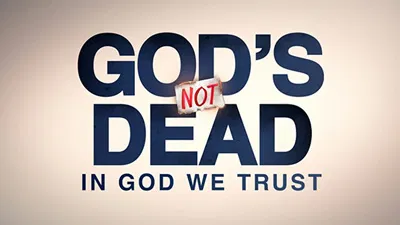Movie Review: Evan Almighty
I was asked this week to review Evan Almighty when it opened on June 22. Before then, I hadn’t any plans to see it, since I figured it would be in the same vein as its predecessor Bruce Almighty, which I didn’t see (and still don’t plan to).

Wikimedia Commons
[Screened on June 22, 2007]
So, after receiving the assignment to review the movie, I thought I’d read up on what others were saying, especially in the Christian community. Most were (and are) billing it as a family-friendly film (it is rated PG) that Christians should support so that Hollywood realizes there’s money to be made in offering good, wholesome family entertainment. Christianity Today sported an advertisement cover for the movie, and Baptist Press posted a favorable review of Evan. (Incidentally, Answers magazine was asked to host an ad for the movie in its issue on the Ark. AiG refused.)
But few1 mentioned the one point that originally caused me to shy away from both films—the fact that God, who cannot be looked on by sinful flesh, is personified by a man (Morgan Freeman). Not the incarnate Son of God, Jesus Christ, who walked among and fellowshipped with people, but God the Father, who is so holy that even Moses wasn’t able to look at Him. And yet, we have here a man portraying the holy and righteous Creator of the universe and sovereign Savior of the world. I guess I'll have to join the ranks of other “stick-in-the-mud” reviewers that brought out this point and were chided with “c’mon, lighten up … it’s entertainment.”
To be fair, Tom Shadyac, the director of both Almighty films and a professing Catholic, says that he took great pains to make sure that the words he put in “God’s” mouth were accurate:
It was a challenge, you know, putting words in God's mouth. I called my friends, who were ministers, or priests, or theologians, and said, “Hey we're putting words in God's mouth, help! What would you say if you were God and you could speak?” Father Ken, at where I go to church—St Agatha’s here in town—wrote some of the best lines.2
But that begs the question—why put words in God’s mouth, when He’s given us His Word, and in this written revelation He says that no man has seen the Father? It may be due to Shadyac’s view of God as a “creative force.”3 (“I believe strongly in this creative force we call God,” he says.) This view is also reflected in the “about the author” section of the book that Evan receives from “God,” Ark Building for Dummies: “God is the creator of the Heavens and the Earth. He lives in all things and has 6,717,323,711 children.”
Although this, in my opinion, is enough to cause Christians to stay away from this movie, I’ll continue with the review of Evan Almighty.
Evan Almighty stars Steve Carell as Evan Baxter, a newscaster-turned-congressman who moves to Washington, D.C. to take his place in congress. He drives a Hummer, and chooses 300 year-old Brazilian cherry wood for his new kitchen cabinets, showing he is “not sensitive to the ‘save the rainforest’ thing.” His platform is “change the world,” and he prays that God will help him do this. His wife Joan (nudge, nudge … get it? Joan of Ark?), played by Lauren Graham, also prays that they would become closer as a family.
“God” (Morgan Freeman) begins to answer their prayers by telling Evan to build an ark. The film is full of biblical allusions (e.g., after Evan freaks out when “God” shows up in the backseat of his car, “God” says, “beginning of wisdom”; the name of Evan’s realtor is Eve Adams), and nods to the biblical account: the company that delivers the wood for the ark is 1-800-Go4-Wood, and references to Genesis 6:14 abound. I won’t bother to explain any more of the plot, since you can find that in just about any review of this movie. Instead, I’ll detail the points that may help you in discerning whether or not this is a movie you want to take your family to.
The Ark
Of course, one of the more obvious relevant-to-AiG points to discuss is about the Ark.
On the positive side, the ark that Evan builds follows the dimensions given in the Bible—it’s not your typical fairytale ark. In fact, according to interviews with the cast, the size of the real Ark (which was built for the film in a subdivision in Virginia) blew them away.4 And the rounded bow and stern portrayed in the movie somewhat resembled the “new” Ark shape depicted in the Creation Museum, and featured in the previous issue of Answers magazine.

Evan and his sons build the entire ark by themselves (well, with the help of the animals) in a matter of weeks. However, this probably wasn’t the case with the original Ark. And there’s no reason to believe that Noah didn’t hire outside help with his building project.
The movie did cause me to think about how life must have been for the original Noah. Did his wife look at him as if he were off his rocker when he told her he was going to build a boat that would save them from a coming flood? Did his colleagues think he was crazy? The movie pictured well the laughter and taunting that Noah must have experienced as he undertook his building project.
And the scenes of Evan pleading for the people to get on the Ark to escape the flood were thought-provoking (although once on board, people closed the door of the ark, rather than God, as in the original account). What was it like for Noah, the preacher of righteousness? How often did he call out for his family members to come with him? (See Noah the evangelist, Noah Revisited, and Noah: the man who trusted God.)
The Flood
[Spoiler alert] The flood for which Evan built the ark is a local one—mainly confined to the valley in which Evan lives. It is the result of a dam that breaks due to a congressman’s willingness to cut corners on the project. In spite of the local nature of the flood, animals from all parts of the world have descended in pairs (pairs only—sevens not shown, and note that the animals used weren't representative of the kinds, instead the movie featured, for example, lions, tigers, leopards) on Evan’s ark-building site.
Of course, the question must be asked (as it is asked to those who deny the original Flood was an earth-covering event), why didn’t “God” just tell Evan to move out of the valley to escape the flood? And why bother to bring animals from all parts of the world when they wouldn’t be affected by the Flood? And why would birds fly in to the area where the ark was being built, when they could have simply flown away?
Perhaps unwittingly, this movie demonstrates the absurdity of the local flood position. In fact, when “God” tells Evan about the coming flood, Evan replies, “Didn’t you promise you’d never do this again?” This question only works if the original flood covered the whole world.
And then there’s reason behind the Genesis Flood. “God” says, “A lot of people miss the point of the story [of the Genesis account of the Flood]. They think it’s about God’s wrath and anger. But really, it’s about believing in each other.” He goes on to illustrate that the animals came two-by-two, showing that we should live side by side with each other, and that Noah and his family worked together to build the Ark. Do I really need to say any more? Read Genesis 6 for yourself and find out why God sent the Flood.
The Environmental Factor
As mentioned previously, Evan drives a Hummer and chooses unreplaceable wood for his cabinets. He agrees to cosponsor a land-use bill in congress that would take land away from protected areas. The obvious point is that these things are bad; caring for the earth is good. In fact, this movie is being touted as the first to “go zero,” or minimize its impact on the environment through various means.
Was Evan over-the-top in its “green” message? Not really, in my opinion. The Bible is certainly clear that we are to be wise stewards of the earth and its inhabitants. It could have been worse. Shadyac admits in an interview:
There was a line originally in the movie that got me to do the movie which was about God saying “You know I'm in all things–the plants, rivers, trees, oceans, wind, animals. Well you're killing me here, kid. You're killing me here.” Not too far, too preachy, not going to be in the movie, but that's the idea behind it. This is all a gift, you know, and the way we treat not only each other but this environment that we are leaving our children is important, and it's a reflection I think of our faith and our relationship with the divine that gave us this life.
Acts of Random Kindness (ARK)
At the end of the movie, “God” reminds Evan of his promise to “change the world.” And how do we change the world? By doing acts of random kindness (ARK). There’s even a church-oriented (marketing-based) initiative to encourage this behavior: ArkAlmighty.com.
Although I agree that we should be kind to others, what’s the point of encouraging Christians to do “random acts of kindness”? Our acts should already be kind as we imitate the actions of our Savior. There should be nothing “random” about what we do—but we should seek opportunities to love our neighbor more than we love ourselves, and preach to those around us the saving gospel of Jesus Christ.
On the not-so-positive side
- There were several uses of the phrase, “Oh my God” and the like. (Not to mention the whole portraying-a-holy-God thing, as mentioned above.)
- “Jackass” was used in reference to an animal and a person.
- There’s an unnecessary reference to reproductive organs.
- There was some “potty humor” (what would you expect with a film filled with animals?).
- Evan is shown coming out of his front door naked, albeit behind strategically placed bushes.
To sum up, should we be wise stewards of God’s creation? Yes. Should we love our neighbor more than we love ourselves? Yes, of course. Should we give a cup of cold water in the name of Christ to a thirsty traveler (an “act of random kindness”)? Yes. Should Christians see the movie? …
I’d suggest making this film an outreach opportunity. When your friends tell you they’ve seen it, talk about the size of the Ark with them. Answer their questions about how Noah could have fit all the animals on the Ark. Point out the effects of the worldwide global earth-inundating (have I made my point clear?) Flood that left its mark. And bring up that the original Ark wasn’t built to “save the animals” or to demonstrate “believing in each other.” It was built to save a remnant of mankind from God’s righteous judgment on man’s rebellion against Him. Show them that they are sinners in need of a Savior, and that Jesus is our Ark of salvation. Remind them that just as God judged the world with water, He will also judge the world with fire.
As I watched the movie, I kept wishing that it was an accurate portrayal of the account of the man named Noah who built an Ark as God instructed him. But it wasn’t. I also kept wishing that Christians had used the $200 million+ to make a film about Noah and the Ark that truly honored God and His Word. Yet, as Carl Kerby points out in his book, Remote Control, we can use what the world produces to share the truth about God and His Word with those around us. This doesn’t mean we need to support the movie industry with our dollars, but we can certainly be prepared to use movies to strike up conversations: “Did you know that real reason God sent the Flood was as a judgment on the wickedness of mankind, and not just so He could see people work together?” “Contrary to Ark Building for Dummies, God isn’t “in” everything, He is the omnipresent Creator of all things.”
Was the movie amusing? Sure, there were some great one-liners by Evan’s executive assistant, played by Wanda Sykes. But is this a movie Christians should “get behind” to show Hollywood there’s money to made in “Christian” films? Call me a stick-in-the-mud, uptight fundamentalist if you will, but I just don't think we can condone the anthropomorphisizing of our holy, omnipotent Creator. But that’s just me.
Footnotes
- James Dobson mentions this point in his review.
- www.hollywoodjesus.com/bruce_almighty.htm
- ChristianityToday.com/movies/interviews/tomshadyac.html
- evanalmighty.com
Recommended Resources

Answers in Genesis is an apologetics ministry, dedicated to helping Christians defend their faith and proclaim the good news of Jesus Christ.
- Customer Service 800.778.3390
- Available Monday–Friday | 9 AM–5 PM ET
- © 2026 Answers in Genesis





